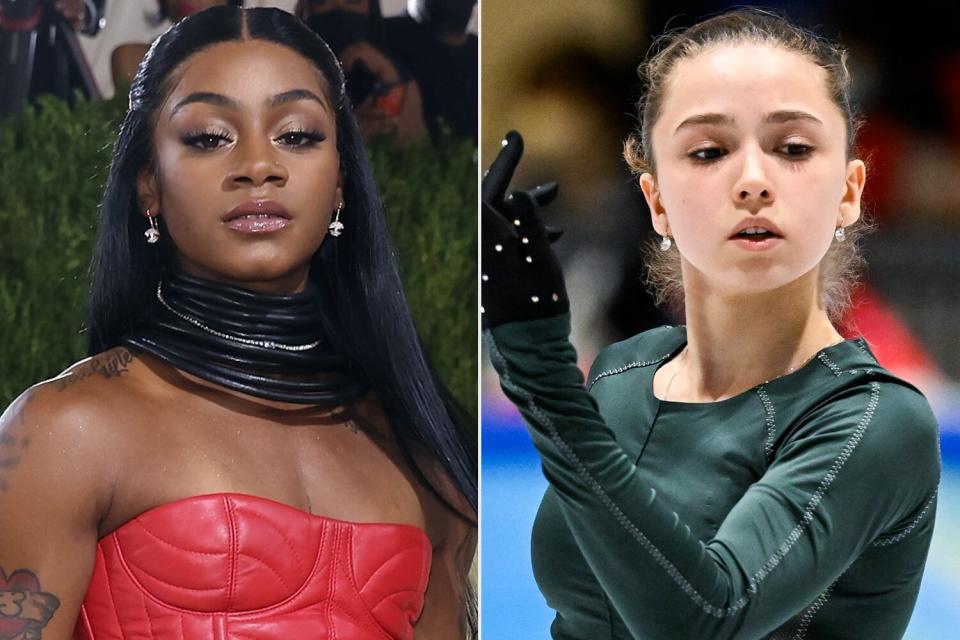IOC Says Sha'carri Richardson and Kamila Valieva's Doping Controversies Are 'Very Different'
- Oops!Something went wrong.Please try again later.
The International Olympic Committee is responding to American track and field athlete Sha'Carri Richardson's claims of a double standard after Russian figure skater Kamila Valieva was allowed to compete at the Olympics following a positive drug test, unlike her own experience.
During a press briefing Wednesday, IOC spokesperson Mark Adams said the two incidents cannot be compared.
"Every single case is very different. [Richardson] tested positive on June 19 (2021), quite a way ahead of the Tokyo Games," Adams said. "Her results came in early order for USADA (U.S. Anti-Doping Agency) to deal with the case on time, before the Games. Ms Richardson accepted a one month period of ineligibility which began on June 28."
For more on Kamila Valieva, listen below to our daily podcast on PEOPLE Every Day.
"I would suggest that there isn't a great deal of similarity between the two cases," he added.
Never miss a story — sign up for PEOPLE's free daily newsletter to stay up-to-date on the best of what PEOPLE has to offer, from juicy celebrity news to compelling human interest stories.
Additionally, Adams told reporters that the IOC is focused on the well being of Valieva during this "tough" time.
"She is in the center of a lot of speculation," Adams said. "It must be very tough for her. We, of course, are in touch with the team, her welfare is the team's first priority, and obviously we are very careful of that but there's only so much that we can do."

Taylor Hill/WireImage; LAURIE DIEFFEMBACQ/BELGA MAG/AFP via Getty Sha'Carri Richardson (left) and Kamila Valieva
On Monday, the Court of Arbitration for Sport (CAS) announced that the 15-year-old figure skater could compete in the short program of the women's skating competition on Tuesday. Valieva's participation in the event came into question after it was revealed she reportedly tested positive for the banned substance Trimetazidine, a heart medication, in December.
The CAS cited Valieva's status as a "protected person" (a minor) in making the decision in accordance with the World Anti-Doping Code. "The panel considered that preventing the athlete to compete at the Olympic Games would cause her irreparable harm in the circumstances," CAS Director General Matthieu Reeb said in a statement, per the Associated Press.
Richardson, 21, won the women's 100m race at the U.S. Olympic track and field trials last summer. However, she lost her spot on Team USA after she tested positive for THC, a chemical in marijuana, following the trials. Because of the decision, she was unable to compete at the Tokyo Olympics. A different organization than CAS, the U.S. Anti-Doping Agency (USADA), handled Richardson's testing and suspension.
RELATED: Figure Skater Kamila Valieva Makes History as She Lands Quad Jump — What to Know About the Athlete
Can we get a solid answer on the difference of her situation and mines? My mother died and I can’t run and was also favored to place top 3. The only difference I see is I’m a black young lady. https://t.co/JtUfmp3F8L
— Sha’Carri Richardson (@itskerrii) February 14, 2022
Richardson first made claims of a double standard in the decision to allow Valieva to compete earlier this week. Tweeting in response to a news article about Valieva, Richardson wrote, "Can we get a solid answer on the difference of her situation and mines [sic]? My mother died and I can't run and was also favored to place top 3. The only difference I see is I'm a black young lady."
"It's all in the skin," she wrote in a separate tweet, then added, "Btw THC definitely is not a performance enhance!!!!!"
She continued, tweeting, "Failed in December and the world just now know however my result was posted within a week and my name & talent was slaughtered to the people."
Wrote Richardson in a further tweet, "Not one BLACK athlete has been about to compete with a case going on, I don't care what they say."
RELATED: What Is the ROC? Why Russia Can't Display Their Flag or Play Their Anthem at the Olympics
Attributable to USOPC CEO Sarah Hirshland: pic.twitter.com/wbGUIR67eS
— USOPC News (@USOPC_News) February 14, 2022
Responding to the Valieva news on Monday, Sarah Hirshland, CEO of the United States Olympic & Paralympic Committee, said in a statement that the organization was "disappointed by the message this decision sends."
"It is the collective responsibility of the entire Olympic community to protect the integrity of sports and to hold our athletes, coaches and all involved to the highest of standards," said Hirshland.
Valieva ultimately did not medal in the women's singles event, finishing in fourth place after an uncharacteristically mistake-ridden performance.
The issue with Valieva comes as Russia is still under an anti-doping penalty partially upheld by the International Court of Arbitration for Sport in 2020. Being only permitted to compete under the ROC name is the result of a years-long tangle of punishments, appeals and court rulings in the wake of reports that Russia was engaged in sometimes elaborate state-sponsored doping at the 2012 and 2014 Olympics.
The Kremlin has strenuously denied these accounts, which have been documented by the World Anti-Doping Agency.
To learn more about Team USA, visit TeamUSA.org. Watch the Winter Olympics, now, and the Paralympics, beginning March 4, on NBC.

